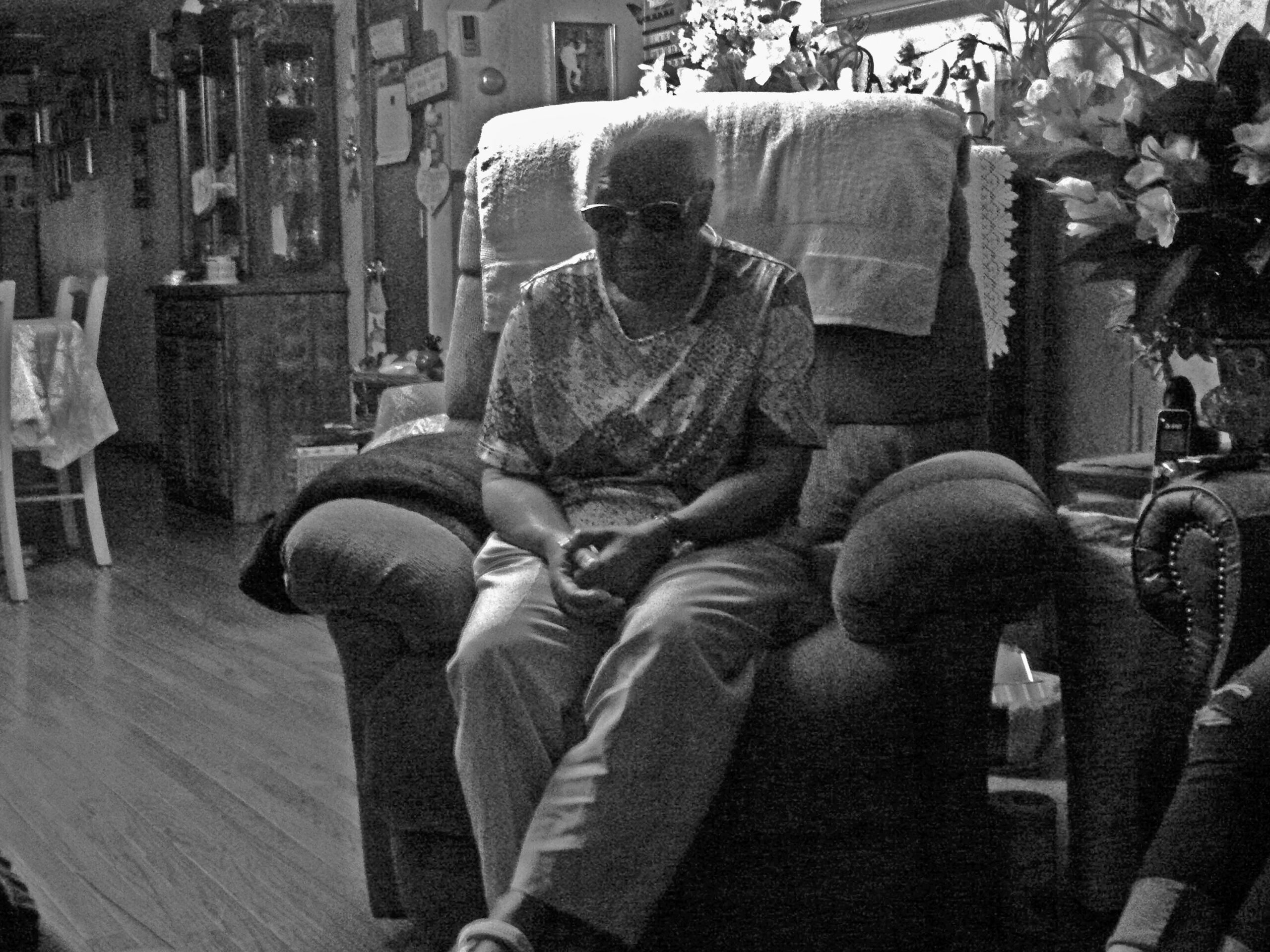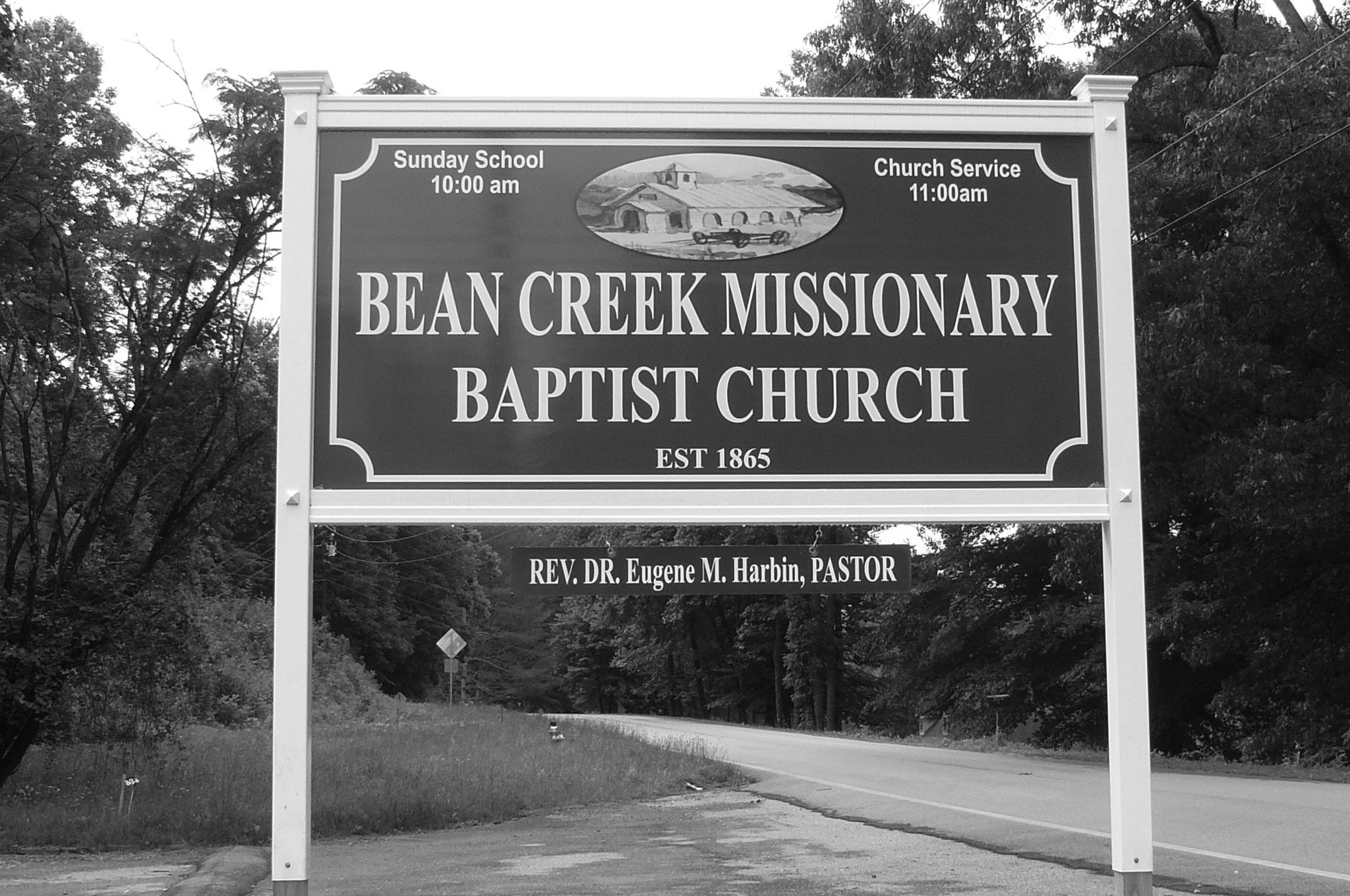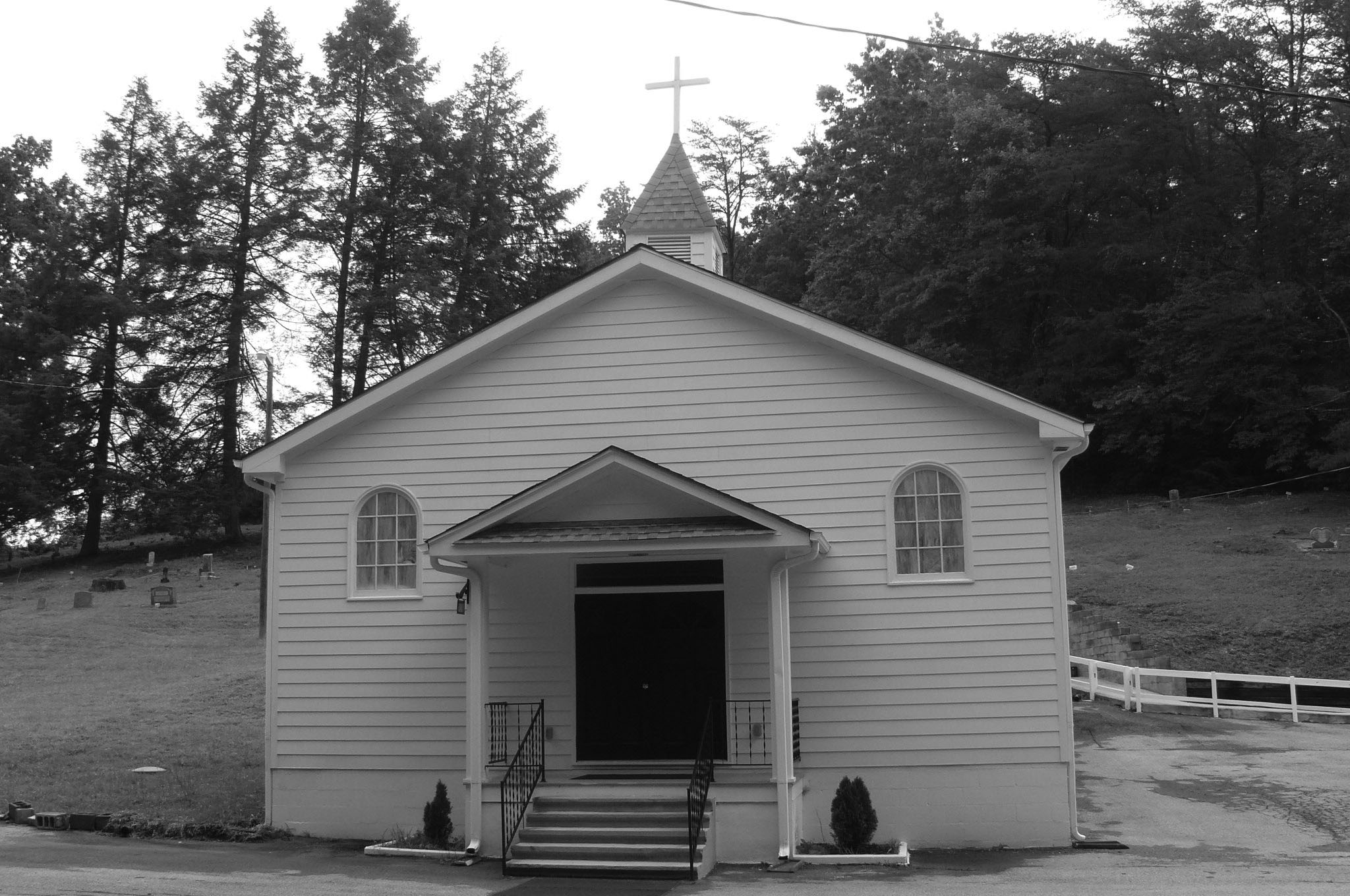In celebration of Black History Month, we are featuring stories from our archive that capture black experiences in Appalachia. Each week in February, we will highlight one individual who shared their story with Foxfire high school students.
Our first featured interview is with Lena Dorsey, who met with students in 2013. Lena grew up in Bean Creek, a historically black community nestled in the Sautee Nacoochee Valley, close to Helen, Georgia. After emancipation, former slaves in White County, Georgia elected to stay and form their own community on the same land their ancestors had worked for years. Until recently, this history was not publicly interpreted. In the early 2000s, the Sautee Nacoochee Center relocated and reconstructed a slave cabin at their community center. This building is now interpreted, and is a key piece of the Bean Creek History Project, a community-based initiative to share the stories of black residents in White County.
Foxfire student Hayden Giovino said of his interview with Lena:
Lena Dorsey is known as the “Mayor of Bean Creek” because she is one of the most recognizable people in Bean Creek and is an honorable icon of the community. Through transcribing and writing this article, I gained a great admiration for Ms. Dorsey and her wisdom. Her knowledge of the community stretches back to a time that only a few people can remember. In this article, Lena Dorsey talks about her childhood and the events that surrounded it, like attending the local baseball games and cheering for the local Valley Vets. She also discusses the farming practices that the whole community was involved in when she was a child, along with the changes she has seen, not only in the community but in the world, as well. Lena Dorsey provides a wonderful example for students in the Foxfire classroom in the way she shares and expresses her heritage and teaches others about the past. I was grateful for the opportunity to work with this article and learn about such a knowledgeable woman.

Lena Dorsey at her home, 2013.
Lena begins her story with the origins of the name “Bean Creek” before diving into her childhood experiences growing up in the Sautee Nacoochee Valley:
I heard that the name “Bean Creek” came from a story where this man was riding a mule. He had a bag of beans and the mule, you know, it stumbled and fell, and the beans busted, and beans came down stream. I heard that’s how Bean Creek got its name.
I was born and raised here. I’m 78 or 79 this year. My daddy was Harry Dorsey and my momma was Pauline [Jarrett] Dorsey. [I was raised] in a wood home, and we had three or four rooms. My grandma [only] had a fireplace, so we stepped up a bit when I come along—we had a heating system. If I had to move [out of the community] in my condition (Lena was blind), I don’t know where I would move to. Just listening to news about other places, where could you just feel safe? Of course, some people are just mean and hard-hearted and that. I think I live in the best part of the world. I just think that in White County,{Georgia], we have some of the best people in the world. In some places, these children don’t care who they kill, even if it’s someone who hasn’t ever harmed anybody. I just feel safer here. The only thing I know is that we are living in the best part of the world. I think White County’s the best place to live because I don’t believe that there isn’t a house in White County that if I was hungry, I couldn’t go get something to eat. That just goes for the whole county.
The Missionary Baptist Church in Bean Creek has been around for about 152 years. We got a new sign down there recently. It might have been made out of logs when it was first built because it was a Methodist Church to begin with, but the only church in the community now is the Baptist Church. There are some old graves in that cemetery; they go back about 150 years I think. There might’ve been a gold mine up here somewhere, but that was before my time. There are big holes where they used to dig, and I assume it was for gold. They must’ve not had too much luck with the gold because I didn’t hear about it.

The school used to be right where the church is sitting now, and the church was kind of out in the parking lot. We left in 1944, when the school was moved from here to Cleveland, Georgia. We were moved down there when I was six years old. It was an old wood building with one room. I guess it went on to seventh grade. I finished high school in 1955 at Hope Springs High School.

Bean Creek Missionary Baptist Church
No one really got into any mischief at school because, back then, everybody was your mom. Back then, you could chastise your child, but nowadays, you can’t do that. We were all just one family around here. Back then, everyone was everybody’s child. You would feed them, you would protect them if they were in danger, and you could teach them right from wrong. When I got out of school, I went to work in private homes. I babysat at Sky Lake, and that was my regular job. I was babysitting when people would come up and camp there and bring their children. My aunt, Lucille Dorsey, used to cook at the camp, so that was my first job. It wasn’t here in Sautee. It was a summer camp, and they used to canoe on the lake. The boys’ side was one side, and the girls’ side was across the lake on the other side. At certain times, they would get together and do activities and things like riding horses, swimming, and camping. There were a lot of kids that were different ages at the camp. They weren’t babies; I think they were all just about school-age. I kept up with some of them for years and years. The camp is a gated community now.
The people that have lived here have grown, though. I don’t remember how many families lived here when I was growing up, but I remember what they did for a living. My daddy and my momma worked for Smith down on the farm, on [Highway] 17, going near Clarkesville. I think they did something before that, but that’s the only thing that I can remember them doing when I was little. I’m the youngest of the family, and there were nine of us, so I don’t remember that well. I don’t live too far now from where my home was when I grew up.
Back then, they had a wood stove when I came up, but before that, they used to cook beans and stuff on the fireplace because they didn’t keep a fire on the stove all day like they would a fireplace. Food tasted better on that wood stove; it sure did. Everything, to me, tasted better then than it does now. They preserve stuff now, and I think that is what is killing us. We used to do it from scratch. You used to have to heat your irons in the fireplace. We had wood stoves that we had to have certain wood for.
They used to make mattresses; I think that they’re called feather ticks or something like that. I liked to get on that. I remember [momma] would get on me for jumping on that bed. We had to sleep about three to a bed because we only had two bedrooms, a kitchen, and a porch. We used to have something like a smokehouse, where we would kill hogs, and that’s where we would keep our meat. I used to hate to milk cows. We raised all of our food. I don’t remember going to the store and buying anything but sugar and flour, and we didn’t use too much sugar. We got the sacks that the flour came in, and my mom made my sister and me dresses and stuff like that. After we emptied the flour, she would make us an outfit out of them. We didn’t throw anything away then. There weren’t that many clothes that we went to buy. She made all of the clothes we had. She canned most of our food in the summertime. She used jars. To me, I think that things tasted better back then.
We used to work at Nora’s Mill, where we would grind corn to make a meal out of cornbread. We had our own chickens; yeah, that was our living. I remember we had to pull weeds. We always had something to do; we didn’t have any spare time. We had chickens, cows, and pigs, and we would feed the pigs all of our scraps and corn. They ate scraps we had from the table. Now they’re giving them all the wrong stuff like syrup [to fatten the pigs up], and they’re killing us along with the pigs.
We used to have an area near the creek that we would call “The Wash-Place.” It had a pipe for water to run down, and I remember going over there and washing clothes. We would go over there with a scrub board and a big pot. Clothes today just couldn’t take it. You had to put them in a pot and boil them; I remember that. We lived kind of up on a hill. The other kids had to work on the farm and all that, but I came along a little too late to work like that.
My daddy and them used to talk about how they had to go to different places, you know, when they had to shuck corn in different people’s smokehouses. Everyone would help each other with their crops when they came in. It was called “corn shucking,” and everybody in the community worked together. They had different nights for different families. We used to get buckets or something make music, and it would be a big celebration. They used to have fun doing that because those were fun nights for them. I guess they had drinking and all of that too, you know. Them and my daddy had a time. They enjoyed it.
All of them used to play baseball. Jessie James, J.T., Jack, John Henry, Bobby, and even my brothers were all ballplayers. They used to have baseball games a little past the church where the ballpark is. They were the Bean Creek Valley Vets. That was where Bean Creek was really popular. They played everyone, some over in Blairsville. I don’t remember how often they had the games, but I know it was more than once a month. If they weren’t playing [there], then they were going somewhere else to play. There were really big crowds when they would play. Cars were parked here and there and all over, you know. People from everywhere were coming. People liked to come here on Labor Day and the Fourth of July because it was a place where they could let their hair down.
Everyone would look forward to ballgames on the weekends. You can’t go up to the ballpark now because after this man bought the property that goes back from the church to the Helen highway, he got that road stopped up. The road came out right there in front of the church. He’s got a gate where you can’t go. We used to go across the hill and hide over there near the bridge—over there near Helen, but now it’s stopped up. he got it where you can’t even go across there now.
The ballpark belonged to Crescent Hill Church over there. You can’t even get any cars through there no more. I think Daddy and them used to play. It wasn’t anything like the Valley Vets, though. Yeah, that was the star of Bean Creek. The only one who didn’t play ball was me. They loved it. I heard that they made their own baseball bats and bases. They made everything. Bobby was one of the youngest players and he was talking about joining a baseball league at one time, but he never did. He went into the army.
Rosie, Andy, Bessie, and I are the oldest ones on the creek now. My brothers and sisters stayed here for a while and then left after they called themselves grown. They went to different places. One of my brothers lived in Birmingham; my other brother and my sister lived in Atlanta. They went for jobs. I had four kids: two boys and two girls. I have a daughter and a son that still live here: Polly Dorsey and Leonard Dorsey. Children nowadays compared to back then—Lord have mercy! Back then, it was “Yes ma’am” and “No sir.” Nobody is brought up like that in these days and times. Now it’s against the law to whip your kid. I bet they would’ve just killed my daddy. He brought us into their world, and he would take us out. I had a good life. My dad never spanked me because I was his pet, so I guess I can say that was because I was the baby.
Kids are smarter now. Now three-year-olds know more than I did back when I was six. The world has just completely changed. I don’t care where you go, you’re going to find a rotten apple in every bunch, but in this county, I don’t know if you could ask for any better.

Hello! I love this article! My grandmother told us before she died that our family migrated from Sautee (White County, Ga) to NC., before she was born. Our last names are Anderson and Trammell. I am on a mission to find my family connection there in Sautee.
We’re glad you enjoyed the article! Try getting in touch with the Sautee-Nacoochee Community Center, they might be able to help!
You can contact the White County Historical Society in the old Courthouse and they have a genealogy room. Carol works the desk and she can help you!
Thank you!
That’s crazy my ancestors are the trammells and I believe a few of them married Andersons as well. I keep seeing the same names pop up. I’m trying to do my family history to find out where I come from. I get stuck in sautee Nacoochee
Hi, Michael! I agree with Addie Rice that your best first step might be the White County Historical Society, and possibly Habersham County as well, given that this area (Sautee) was built out of Habersham County.
John Singleton
Foxfire
My name is Farrah, I am a Trammell by way of my father’s side. I remember stories my grandmother used to tell us.
Thank you Ms Lena Dorsey for sharing your story. I am privileged to know that you, Ms Lena are related to me. You are my 2nd cousin 2x removed. Some of my ancestors were the founding members of Bean Creek Missionary Baptist Church. It is thrilling to “hear” firsthand the history and wisdom that you have shared via this article. Also I am grateful for the hints from others which will assist me in moving forward in my research. I am a great-grandmother with a passion and determination to tell (and share) “Our Story”!! Many Many Blessings!!